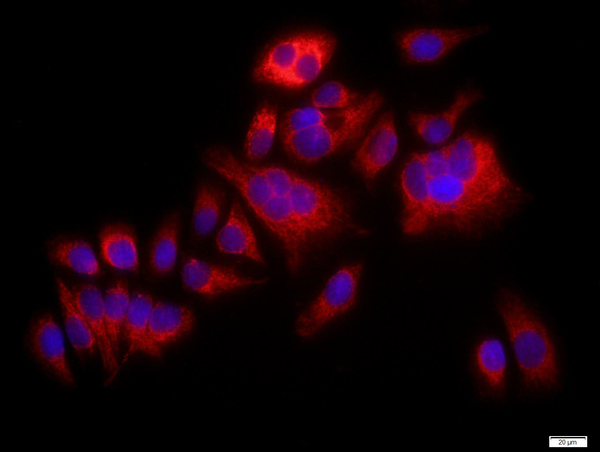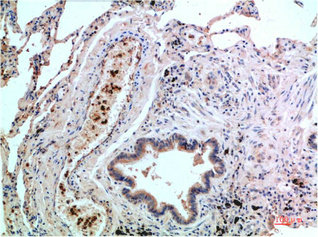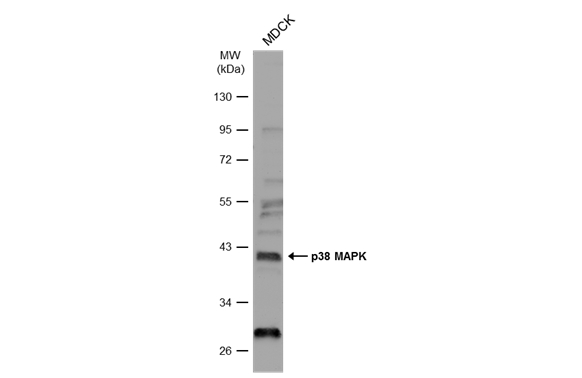p38 alpha (MAP Kinase) Antibody: PerCP
ORB147368
ApplicationsImmunoFluorescence, Western Blot, ELISA, ImmunoCytoChemistry, ImmunoHistoChemistry
Product group Antibodies
ReactivityHuman, Mouse, Rat
TargetMAPK14
Overview
- SupplierBiorbyt
- Product Namep38 alpha (MAP Kinase) Antibody: PerCP
- Delivery Days Customer16
- Application Supplier NoteDetects ~38kDa protein corresponding to p38alpha MAPK when loaded with 6 ng of purified p38alpha by chemiluminescent immunoblot analysis using Goat anti-mouse IgG:HRP as the secondary antibody.
- ApplicationsImmunoFluorescence, Western Blot, ELISA, ImmunoCytoChemistry, ImmunoHistoChemistry
- Applications SupplierWB (1:1000), IHC (1:1000) ELISA, ICC, IF, IHC, WB
- CertificationResearch Use Only
- ClonalityMonoclonal
- Clone ID9F12
- Concentration1 mg/ml
- ConjugatePerCP
- Gene ID1432
- Target nameMAPK14
- Target descriptionmitogen-activated protein kinase 14
- Target synonymsCSBP, CSBP1, CSBP2, CSPB1, EXIP, Mxi2, PRKM14, PRKM15, RK, SAPK2A, p38, p38ALPHA, mitogen-activated protein kinase 14, CSAID-binding protein, MAP kinase 14, MAP kinase Mxi2, MAP kinase p38 alpha, MAX-interacting protein 2, cytokine suppressive anti-inflammatory drug binding protein, mitogen-activated protein kinase p38 alpha, p38 MAP kinase, p38 mitogen activated protein kinase, p38alpha Exip, stress-activated protein kinase 2A
- HostMouse
- IsotypeIgG1
- Protein IDQ16539
- Protein NameMitogen-activated protein kinase 14
- Scientific DescriptionMouse monoclonal to p38 alpha (PerCP). The MAPK (mitogen activated protein kinase) comprises a family of ubiquitous praline-directed, proteinserine/ threonine kinases which signal transduction pathways that control intracellular events including acute responses to hormones and major developmental changes in organisms. This super family consists of stress activated protein kinases (SAPKs); extracellular signal-regulated kinases (ERKs); and p38 kinases, each of which forms a separate pathway. The kinase members that populate each pathway are sequentially activated by phosphorylation. Upon activation, p38 MAPK/SAPK2alpha translocates into the nucleus where it phosphorylates one or more nuclear substrates, effecting transcriptional changes and other cellular processes involved in cell growth, division, differentiation, inflammation, and death. Specifically p38 always acts as a pro-apoptotic factor with its activation leading to the release of cytochrome c from mitochondria and cleavage of caspase 3 and its downstream effector, PARP. p38 MAPK is activated by a variety of chemical stress inducers including hydrogen peroxide, heavy metals, anisomycin, sodium salicylate, LPS, and biological stress signals such as tumor necrosis factor, interleukin-1, ionizing and UV irradiation, hyperosmotic stress and chemotherapeutic drugs. As a result, p38 alpha has been widely validated as a target for inflammatory disease including rheumatoid arthritis, COPD and psoriasis and has also been implicated in cancer, CNS and diabetes..
- ReactivityHuman, Mouse, Rat
- Storage InstructionSee Manual
- UNSPSC12352203






